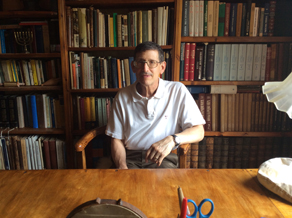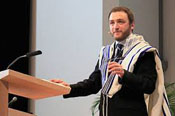PUBLICATIONS

RICHARD HARVEY
BOOKS
- Mapping Messianic Jewish Theology - A Constructive Approach, Studies in Messianic Jewish Theology (Vrin, 2007).
Messianic Judaism is a contemporary movement that integrates faith in Yeshua as Israel's Messiah with Jewish belief and practice. As such it challenges the neat diversion between Christianity and Judaism. Richard Harvey maps the diverse theological terrain of this young movement. The book examines various topics of theological concern, such as G-d's nature, activity and attributes, the Messiah and the Messianic Jewish Christologies, the Torah in theory (the meaning and interpretation of the Torah in the Light of Jesus) and the Torah in practice (Messianic practice of Sabbath, food laws and Passover) and eschatology. READ here a review of this book.
- Raymundus Martini and the Pugio Fidei (Richard Harvey, First Edition, 2008).
A very interesting essay (Richard's MA dissertation - 1994) on the life and work of Raymundus Martini, a Medieval controversioalist and the author of Pugio Fidei.
- Towards a Messianic Jewish Theology of Reconciliation (Richard Harvey, Second Edition, 2013).
Messianic Jews can play a significant part as peacemakers in the Israeli-Palestinian conflict. A theology and praxis of reconciliation is needed to address its political, social psychological and theological dimensions. Recent discussions of Palestinian and Israeli strategic proposals for conflict resolution provide a context in which a survey of Messianic Jewish understandings of the present conflict, proposals to end it, and the contribution Messianic Jews can make are analysed and evaluated. Concluding proposals for the development of a Messianic Jewish theology of reconciliation include the need for hope and the development of intra-group discourse that can engage strategically with other conflict partners.
ARTICLES
- What Shapes a Jewish identity ?
- Messianic Jewish Theology : have we gone too far or not far enough ?
- Jesus the Messiah in Messianic Jewish Thought
- A Jewish Response to the Crusades
 MARK S. KINZER
MARK S. KINZER
BOOKS
- Post-Missionary Messianic Judaism : Redifining Christian engagement with the Jewish people (Grand Rapids: Brazos Press, 2005).
In this book Kinzer seeks to redefine Messianic Judaism in terms of its relationship with Judaism and Christianity Relying not only on his own biblical scholarship and exegesis, but on that of many other scholars as well, Kinzer presents the reader with a form of Messianic Judaism that retains faithfulness both to the traditions and teachings of Judaism, and to New Testament theology. Kinzer's book, -having received wide recognition due to its publication by a mainstream academic publisher-, provides a way for both a fresh and timely way of bridging the schism that remains between Judaism and Christianity.
- Israel's Messiah and the People of God: A Vision for Messianic Jewish Covenant Fidelity (Wipf & Stock Pub, 2011).
Israel's Messiah and the People of God presents a rich and diverse selection of essays by theologian Mark Kinzer, whose work constitutes a pioneering step in Messianic Jewish theology. Including several pieces never before published, this collection illuminates Kinzer's thought on topics such as Oral Torah, Jewish prayer, eschatology, soteriology, and Messianic Jewish-Catholic dialogue. This volume offers the reader numerous portals into the vision of Messianic Judaism offered in Kinzer's Postmissionary Messianic Judaism (2005).
- Searching Her Own Mystery (Wipf & Stock Pub, 2015). The sacramental realities of Jewish life within the ecclesia ex circumcisione of the New Testament era embodied the spiritual link binding genealogical-Israel to its appointed Messiah while simultaneously joining the Body of Christ to genealogical-Israel. (168-69)
ARTICLES
- Israel's Eschatological Renewal in Water and Spirit : a Messianic Jewish Perspective on Baptism
 ANTOINE LEVY
ANTOINE LEVY
BOOKS
- Le Crée et l'Incrée : Maxime le Confesseur et Thomas d'Aquin - Aux sources de la querelle palamienne (Vrin, 2007).
In this book, written in French, fr. Antoine deals with the ambiguous reception of the Byzantine tradition by the Catholic Church. By invoking the authority of St Thomas Aquinas, the western theologians did not hesitate to reject the idea of a real distinction between essence and divine energies, as well as the notion of uncreated grace, which held a fundamental significance in Gregory Palamas' vision (XIV° century). On the other hand, in recent times, these same theologians have re-discovered Maximus the Confessor (VII° century) as being an outstanding precursor of Thomas Aquinas. In this context, how is Gregory Palamas' doctrine to be considered without the patronage of Maximis the Confessor ? How to reckon both theologians in the common light of Thomas Aquinas' thinking ? By analysing the contexts and the doctrinal/conceptuals discussions, the author posits a newly discovered coexistence of the two distincts representations between the created and the uncreated.
ARTICLES
VLADIMIR PIKMAN
ARTICLES
- How European Messianic Jews can Fulfil their Role
- Jewish and Historical Foundations for Post-Holocaust Messianic Soteriology




